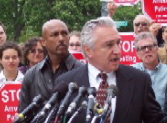In an otherwise great piece putting ONDCP's pot potency panic in perspective, Clara Jeffery at
Mother Jones throws a brick at drug policy reformers:
As in so many things these days, one wishes for something approximating independent analysis. I don't trust the government's research on drugs; its hyperbole and scare tactics on pot in particular seemed design to defend status quos (border and prison policies) that worsen, not solve, larger societal problems at hand. Nor do I trust NORML et al, even, and perhaps especially, when, having gotten nowhere on legalization per se, they reframe the issue as a balm for the sick and dying. Allowing medical marijuana is a no-brainer in my book, but I just think it's a little unseemly when perfectly healthy pot-positive types hide behind AIDS and cancer patients.
Jeffery questions the credibility of the federal drug war establishment, then borrows their favorite talking point and slaps us with it.
Yet, the idea that marijuana policy reformers have somehow exploited patients is incoherent on its face. We have defended patients because their persecution is one of the most tragic consequences of the great war we oppose. That our efforts on behalf of patients have been particularly successful is a product of political realities, not an indictment of our strategy. We don't get to choose which of our issues gain traction.
This fight was brought to our doorstep in the form of sick people and their caretakers getting arrested. Our disgust over the persecution of medical marijuana patients is very real and our willingness to fight and win major victories on their behalf has been amply demonstrated. These patients are our friends and family, literally.
Nor are we hiding in any sense of the word. Really, what could be more obviously wrong than the suggestion that marijuana reformers are somehow concealing our agenda? It is plastered atop our websites, it is spelled out in our press releases and on our t-shirts, and it is the first thing we'll explain to anyone willing to listen.
Clara Jeffery, why is it ok for you to call medical marijuana a "no-brainer," and not us? We spoke of compassion, and we then built compassionate policies out of thin air and against massive opposition. No, we don't hide behind AIDS and cancer patients. We march with them.
Update: Paul Armentano at NORML tells me that Mother Jones turned down a remarkably similar story he submitted a month ago, only to then publish this version. This illustrates two important things:
1. While Mother Jones purports not to trust NORML, they like Paul Armentano's story ideas and echo his analysis.
2. Having received multiple submissions from Paul, Mother Jones almost certainly knows that he does not "hide behind AIDS and cancer patients," because they've seen him writing about other topics, including this one.
Ultimately, the attack against NORML is just completely without merit or provocation. Clara Jeffery owes an explanation.
 Montel at a 2005 press conference with Rep. Maurice Hinchey
Montel at a 2005 press conference with Rep. Maurice Hinchey